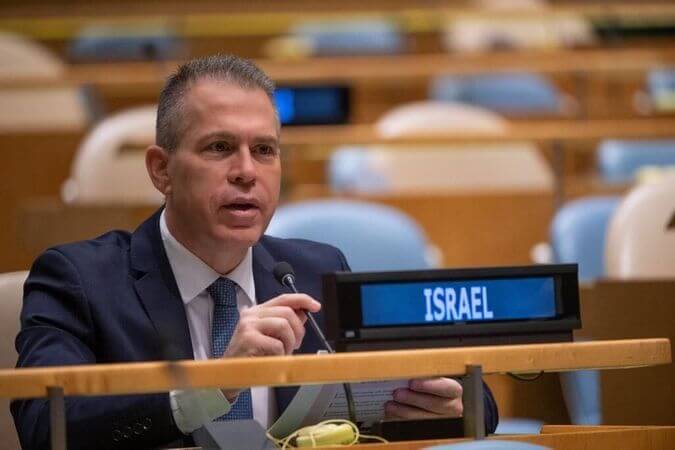Israel’s Ambassador to the United States and the United Nations Gilad Erdan said the momentum of the Abraham Accords may soon begin to transfer into friendlier treatment toward Israel within the UN, an institution that has long displayed deeply-rooted anti-Israel sentiments.
“I believe that the effects of the Abraham Accords will soon be felt at this institution…that the new voices emerging from within the Arab world, accepting and embracing Israel will grow louder and turn into votes for truth and peace at the UN,” Erdan said at the UN Watch database launch Thursday, adding that “peace is spreading in the Middle East, and the anti-Israel consensus in the region is crumbling.”
Erdan believes we are living in a time in history when new priorities in the Middle East are converging with unprecedented international challenges, allowing Israel the opportunity to display its innovative and creative abilities, Erdan’s office told The Foreign Desk.
The Jewish state garnered global attention in the past year with its rapid COVID-19 vaccination rollout that resulted in Israel leading the world in the percentage of population vaccinated, putting in the forefront its ability to be a world leader in an area where many countries have struggled to find their footing.
As ambassador to both the U.S. and U.N., Erdan has the unique opportunity to work closely with the U.S. to translate the historic progress made in the Middle East through the peace accords into the U.N., in an attempt to slowly but surely rid the institution of its anti-Israel bias.
According to his office, Erdan has met with over 40 UN ambassadors who showed great interest in Israel and has had warm interactions with countries that would not have been anticipated prior to the Abraham Accords, fueling his hope that the momentum produced by the normalization deals will eventually lead to Israel becoming known for its leadership on the world stage rather than for the conflict that has riddled its territory for decades.
While Erdan is optimistic, he emphasizes that it will take much more work to overcome the deeply ingrained anti-Semitism held by “many people, organizations, and countries” that are therefore “unable to even consider objective evidence and acknowledge the shortcomings of the UN and its bias against Israel.”
Israel faces unjust condemnation within the UN with “more resolutions adopted against [it] than any other country including Syria, Iran, and North Korea” while also being “the subject of more special sessions at the Human Rights Council than any other country.”
Perhaps the most revealing evidence of the UN’s anti-Semitism, Erdan cited, is the fact that “while the General Assembly and Security Council passed hundreds of resolutions condemning Israel, we are still waiting to see even one resolution condemning Hamas or Hezbollah,” both U.S-designated Foreign Terrorist Organizations.
“These and numerous other examples of the UN’s moral failings and transformation into a shameful, politically motivated body have made many people skeptical about the institution’s motives and its ability to facilitate real change. While the skepticism is warranted and even crucial, the cynicism is dangerous,” said Erdan, citing that many countries continue to look to the UN for guidance and “use the UN’s lies and one-sided language as a cloak of legitimacy to hide their anti-Semitic ambitions.”
During the Trump administration, Israel signed normalization deals with Morocco, Sudan, the United Arab Emirates, and Bahrain.
Prime Minister Benjamin Netanyahu announced this week that four more Arab nations are expected to sign onto the Abraham Accords in the near future; although, the countries were not specified.









